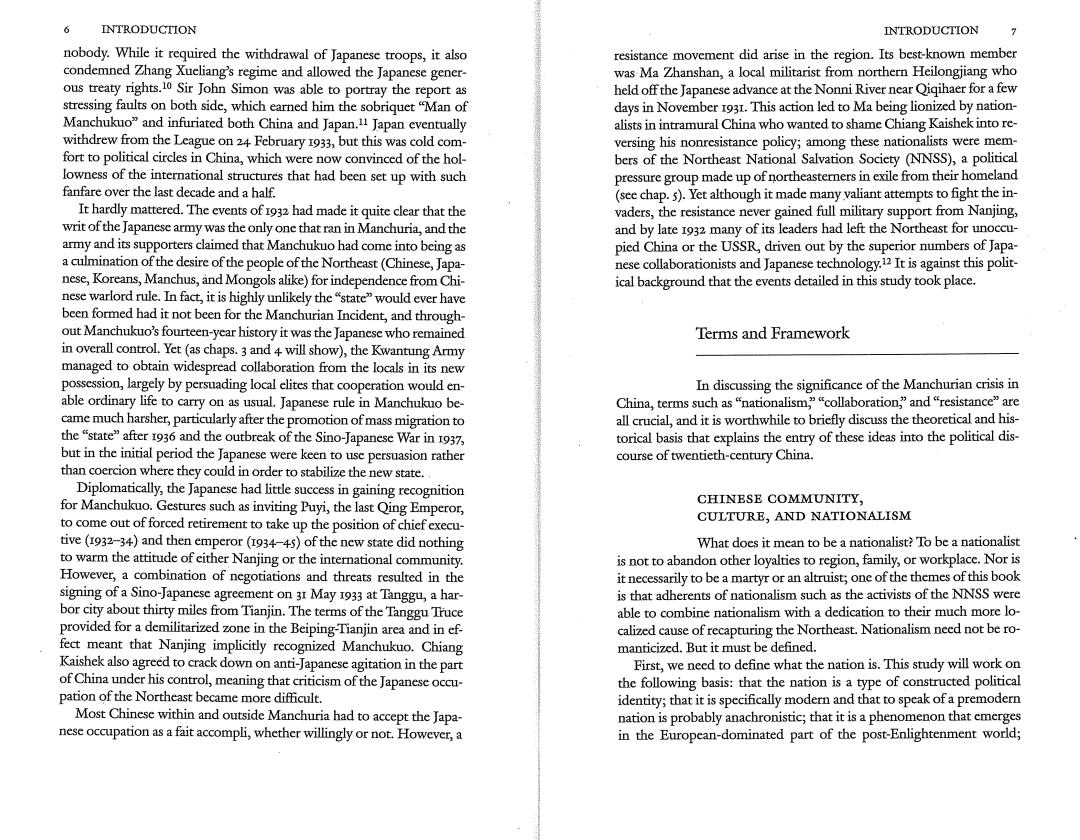正在加载图片...

6 INTRODUCTION INTRODUCTION nobody.While it required the withdrawal of Japanese troops,it also resistance movement did arise in the region.Its best-known member condemned Zhang Xucliang's regime and allowed the Japanese gener- was Ma Zhanshan,a local militarist from northern Heilongjiang who ous treaty rights.10 Sir John Simon was able to portray the report as held off the Japanese advance at the Nonni River near Qigihaer for a few stressing faults on both side,which earned him the sobriquet "Man of days in November 1931.This action led to Ma being lionized by nation- Manchukuo"and infuriated both China and Japan.11 Japan eventually alists in intramural China who wanted to shame Chiang Kaishek into re- withdrew from the League on 24 February 1933,but this was cold com- versing his nonresistance policy;among these nationalists were mem- fort to political circles in China,which were now convinced of the hol- bers of the Northeast National Salvation Socicty (NNSS),a political lowness of the international structures that had been set up with such pressure group made up of northeasterners in exile from their homeland fanfare over the last decade and a half. (see chap.5).Yet although it made many valiant attempts to fight the in- It hardly mattered.The events of 1932 had made it quite clear that the vaders,the resistance never gained full military support from Nanjing, writ of the Japanesc army was the only one that ran in Manchuria,and the and by late 1932 many of its leaders had left the Northeast for unoccu- army and its supporters claimed that Manchukuo had come into being as pied China or the USSR,driven out by the superior numbers of Japa- a culmination of the desire of the people of the Northeast(Chinese,Japa- nese collaborationists and Japanese technology.12 It is against this polit- nese,Koreans,Manchus,and Mongols alike)for independence from Chi- ical background that the events detailed in this study took place. nese warlord rule.In fact,it is highly unlikely the "state"would ever have been formed had it not been for the Manchurian Incident,and through- out Manchukuo's fourteen-year history it was the Japancse who remained Terms and Framework in overall control.Yet (as chaps.3 and 4 will show),the Kwantung Army managed to obtain widespread collaboration from the locals in its new possession,largely by persuading local elites that cooperation would en- In discussing the significance of the Manchurian crisis in able ordinary life to carry on as usual.Japanese rule in Manchukuo be- China,terms such as“nationalism,”collaboration,”and“resistance”are came much harsher,particularly after the promotion of mass migration to all crucial,and it is worthwhile to briefly discuss the theoretical and his- the "state"after 1936 and the outbreak of the Sino-Japanese War in 1937, torical basis that explains the entry of these ideas into the political dis- but in the initial period the Japanese were keen to use persuasion rather course of twentieth-century China. than coercion where they could in order to stabilize the new state. Diplomatically,the Japanese had little success in gaining recognition for Manchukuo.Gestures such as inviting Puyi,the last Qing Emperor, CHINESE COMMUNITY, to come out of forced retirement to take up the position of chief execu- CULTURE,AND NATIONALISM tive(1932-34)and then emperor(1934-45)of the new state did nothing What does it mean to be a nationalist?To be a nationalist to warm the attitude of either Nanjing or the international community. is not to abandon other loyalties to region,family,or workplace.Nor is However,a combination of negotiations and threats resulted in the it necessarily to be a martyr or an altruist;one of the themes of this book signing of a Sino-Japanese agreement on 3r May 1933 at Tanggu,a har- is that adherents of nationalism such as the activists of the NNSS were bor city about thirty miles from Tianjin.The terms of the Tanggu Truce able to combine nationalism with a dedication to their much more lo- provided for a demilitarized zone in the Beiping-Tianjin area and in ef- calized cause of recapturing the Northeast.Nationalism need not be ro- fect meant that Nanjing implicitly recognized Manchukuo.Chiang manticized.But it must be defined. Kaishek also agreed to crack down on anti-Japanese agitation in the part First,we need to define what the nation is.This study will work on of China under his control,meaning that criticism of the Japanese occu- the following basis:that the nation is a type of constructed political pation of the Northeast became more difficult. identity;that it is specifically modern and that to speak of a premodern Most Chinese within and outside Manchuria had to accept the Japa- nation is probably anachronistic;that it is a phenomenon that emerges nese occupation as a fait accompli,whether willingly or not.However,a in the European-dominated part of the post-Enlightenment world;